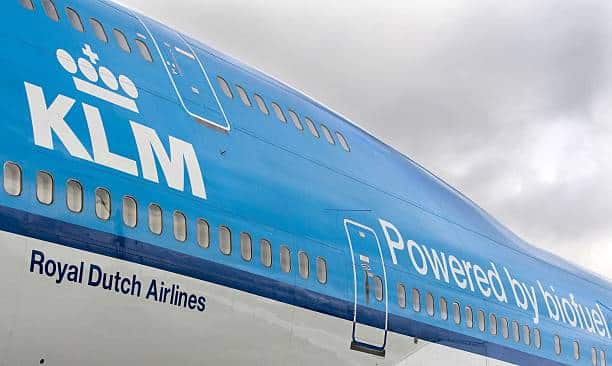World
KLM Supports EU’s Green Aviation Fuel Initiative for Sustainability

KLM has broadly welcomed the European Commission’s initiative aimed at enhancing access to alternative aviation fuels, a move that the airline believes is crucial for the sustainability of the aviation sector. This response follows the publication of the **Sustainable Transport Investment Plan (STIP)**, which outlines strategies to scale up the production of sustainable aviation fuels (SAF and eSAF) across Europe.
The Dutch airline described the STIP as a significant milestone in accelerating the transition toward greener aviation practices. According to KLM, it is vital that the measures proposed in the plan are effectively implemented to make SAF more affordable and to bolster the competitiveness of the European aviation industry.
International Air Transport Association (IATA) also expressed support for the STIP but indicated that the initiative requires further enhancements. KLM reiterated that the availability of affordable alternative fuels is essential for achieving the **2050 climate goals**. The airline supports the proposed European SAF mandate, which aims for a **2% SAF blend by 2025**, increasing to **6% by 2030** and **20% by 2035**.
Concrete Measures for Production and Affordability
KLM highlighted that the STIP includes specific measures designed to accelerate the production of SAF and eSAF. These measures aim to lower costs and stimulate investments in cleaner technologies and infrastructure. The airline also noted the current challenges it faces in the European market, particularly concerning the availability and affordability of SAF.
The European Commission’s initiative to allocate revenues from the Emissions Trading System (ETS) to support aviation decarbonization was welcomed by KLM. This approach is expected to provide producers with greater certainty and facilitate the rapid expansion of production capacity.
KLM has positioned itself as one of the world’s largest purchasers of SAF, investing significantly in the development and utilization of alternative fuels. Through collaborations with partners like **SkyNRG** and **Neste**, KLM is actively working to increase SAF production both in the Netherlands and throughout Europe.
Moreover, KLM is a co-founder of **Project Skypower**, an initiative dedicated to advancing eSAF production. The Netherlands is well-suited to lead in this area, bolstered by the strategic location of the **Port of Rotterdam** and the presence of innovative production and logistics firms.
Ensuring a Level Playing Field
KLM emphasized the importance of ensuring a level playing field through the measures outlined in the STIP. This is vital for maintaining the global competitiveness of European airlines. The airline insists that with appropriate investments from the EU and its member states, significant progress can be made toward a cleaner, more sustainable aviation sector.
Alternative aviation fuels, which are derived not from fossil sources but from waste materials like used cooking oil, have a notably lower carbon footprint. While SAF emits a similar amount of CO2 during flight, its total life-cycle carbon footprint—from production to combustion—is at least **65% lower** than that of conventional kerosene.
KLM’s endorsement of the STIP marks a pivotal step in the aviation industry’s efforts to reduce its environmental impact, highlighting the collective responsibility of stakeholders to transition towards sustainable aviation practices.
-

 Top Stories2 months ago
Top Stories2 months agoTributes Surge for 9-Year-Old Leon Briody After Cancer Battle
-

 Entertainment4 months ago
Entertainment4 months agoAimee Osbourne Joins Family for Emotional Tribute to Ozzy
-

 Politics4 months ago
Politics4 months agoDanny Healy-Rae Considers Complaint After Altercation with Garda
-

 Top Stories3 months ago
Top Stories3 months agoIreland Enjoys Summer Heat as Hurricane Erin Approaches Atlantic
-

 World4 months ago
World4 months agoHawaii Commemorates 80 Years Since Hiroshima Bombing with Ceremony
-

 Top Stories2 months ago
Top Stories2 months agoNewcastle West Woman Patricia Foley Found Safe After Urgent Search
-

 Top Stories4 months ago
Top Stories4 months agoFianna Fáil TDs Urgently Consider Maire Geoghegan-Quinn for Presidency
-

 World4 months ago
World4 months agoCouple Convicted of Murdering Two-Year-Old Grandson in Wales
-

 World4 months ago
World4 months agoGaza Aid Distribution Tragedy: 20 Killed Amid Ongoing Violence
-

 World4 months ago
World4 months agoAristocrat Constance Marten and Partner Convicted of Infant Murder
-

 Top Stories3 months ago
Top Stories3 months agoClimbing Errigal: A Must-Do Summer Adventure in Donegal
-

 Top Stories3 months ago
Top Stories3 months agoHike Donegal’s Errigal Mountain NOW for Unforgettable Summer Views









